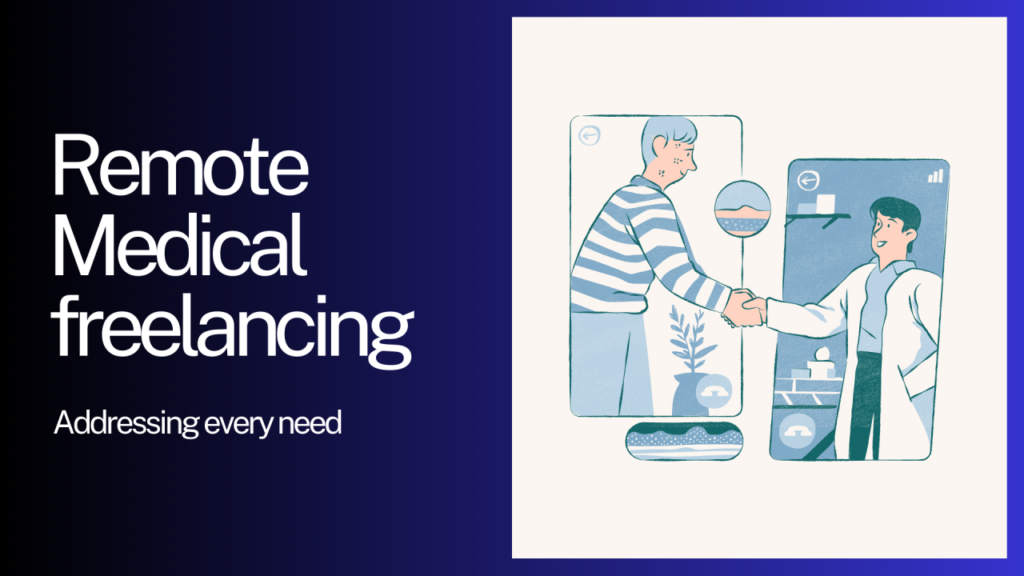The medical field has always been one of the most dynamic and demanding professions. The recent technological advancements and the global shift towards remote work have given rise to a new and exciting opportunity: remote medical freelancing. This innovative approach transforms healthcare delivery, provides flexibility for professionals, and improves access to medical services for patients worldwide.
What is Remote Medical Freelancing?
Remote medical freelancing involves healthcare professionals contractually offering services, usually through digital platforms, from locations outside traditional clinical settings. This can include various activities such as telemedicine consultations, medical writing, online tutoring, medical coding, and even providing second opinions on complex cases. It allows doctors, nurses, therapists, and other medical professionals to work independently, often from their homes or other remote locations.
Benefits for Healthcare Professionals
- Flexibility and Work-Life Balance: One of the most significant advantages of remote medical freelancing is the flexibility it offers. Medical professionals can choose their working hours, balancing work with personal commitments. This is particularly beneficial for those with family responsibilities or those who prefer a non-traditional work schedule.
- Diverse Opportunities: Freelancing opens doors to a variety of job opportunities that might not be available in a traditional healthcare setting. Professionals can engage in different types of work, from patient care and medical research to consultancy and content creation.
- Increased Autonomy: Freelancers have more control over their careers. They can select the projects they want to work on, negotiate their rates, and build a portfolio that reflects their expertise and interests.
- Continued Professional Development: Engaging in various freelancing projects can enhance a professional’s skills and knowledge. Exposure to different cases and challenges fosters continuous learning and professional growth.
Benefits for Patients and Healthcare Systems
- Improved Access to Care: Remote medical freelancing can help address the issue of healthcare accessibility, especially in rural or underserved areas. Patients can consult specialists from around the world, regardless of their geographic location.
- Cost-Effective Solutions: For healthcare systems and patients alike, remote freelancing can be more cost-effective. It reduces the need for physical infrastructure and allows for efficient allocation of resources.
- Convenience: Patients can receive medical advice and treatment from the comfort of their homes, reducing the need for travel and minimizing exposure to contagious diseases.
- Timely Medical Assistance: Remote consultations can often be arranged more quickly than in-person visits, providing timely medical assistance, which is crucial in many situations.
Challenges and Considerations
While remote medical freelancing offers numerous benefits, it also comes with challenges that need to be addressed:
- Regulatory and Licensing Issues: Different countries and states have varying regulations regarding telemedicine and remote medical practice. Professionals must ensure they comply with all relevant laws and obtain necessary licenses.
- Data Security and Privacy: Handling patient information remotely requires stringent data security measures to protect sensitive information and maintain patient confidentiality.
- Technology Barriers: Both patients and professionals must have access to reliable technology and internet connectivity. This can be a limiting factor in some regions.
- Quality of Care: Ensuring that the quality of care remains high in a remote setting is essential. Continuous training and adherence to best practices are necessary to maintain standards.
The Future of Remote Medical Freelancing
The COVID-19 pandemic has accelerated the adoption of telehealth and remote medical services, highlighting their potential to revolutionize healthcare. As technology continues to advance and more professionals embrace this model, remote medical freelancing is likely to become an integral part of the healthcare ecosystem.
Investing in robust digital infrastructure, updating regulatory frameworks, and fostering a culture of continuous learning and adaptability will be crucial in maximizing the benefits of remote medical freelancing. For healthcare professionals, this new frontier offers an exciting opportunity to redefine their careers and contribute to a more accessible, efficient, and patient-centered healthcare system.
